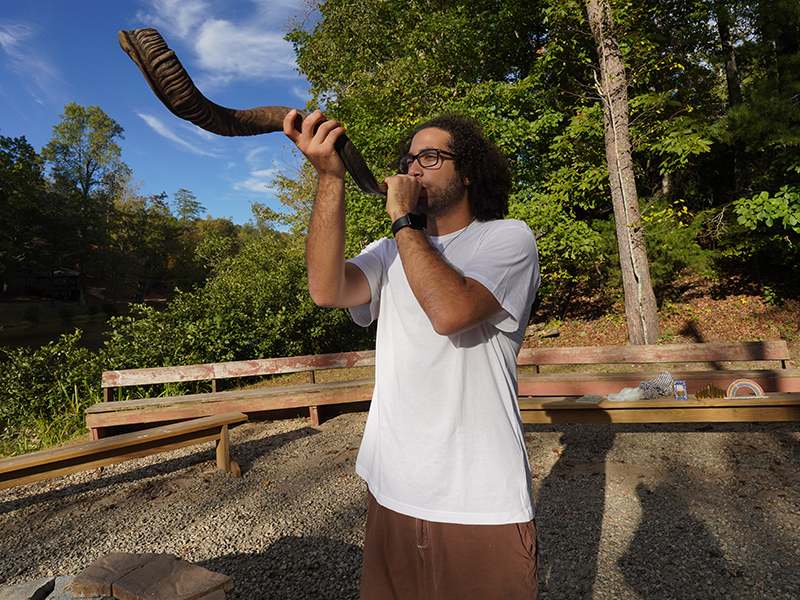Is there a spiritual or moral dimension to how we choose what we eat? Parashat Sh'mini from the book of Leviticus opens up a conversation about keeping kosher – Rabbi Rick Jacobs moves it along.
Five ways to listen:
- Watch the video snapshot below
- Listen to the full podcast below
- Subscribe to the podcast on iTunes
- Suscribe to the RSS feed
- Read the Transcript below
Transcript
Welcome to episode ten of On the Other Hand: 10 Minutes of Torah, clearly brought to you this week by the number ten. A podcast presented by reformjudaism.org. Each week, we reflect on more than 2000 years of Jewish wisdom in just ten minutes, with modern day commentary on the weekly Torah portion. Of course we think there are plenty of ways to interpret Torah, and we want to hear what you think. Talk to us on Twitter, our handle is @URJ. Like us at facebook.com/reformjudaism, and subscribe to the podcast on iTunes. This week, Rabbi Rick Jacobs, president of the Union for Reform Judaism, explores questions of whether there is a spiritual or moral dimension to how we choose what we eat. Parashat Sh’mini from the Book of Leviticus opens up a conversation about keeping kosher. Rabbi Jacobs moves it along.
This week, we focus our attention on Parashat Sh’mini. In the Book of Leviticus, we learn more of the laws that govern not just the ancient Jewish practice, but also our world. We learn about the laws of kashrut, the kosher laws. What makes something ritually fit or ritually impure. And we know that the biggest category for us usually is the category of eating. What is a kosher meal, what is a non-kosher meal?
If I had to just throw a little bit of a trick question at people, if I asked, which of the following is not kosher according to the Torah-- cricket, rabbit, or locust? Again, I'm not going to come check you on this, but it turns out the one that's not kosher is rabbit. But I doubt you've been served a delicious kosher cricket or locust lately.
The question is not just what are the categories. What's the meaning about the way we choose to eat? Is there a spiritual and moral dimension to the food that we not only cook and share, but eat? And I'd like to think that the category is a big category, and it's not a category only for those who are very traditionally observant.
I remember when I was a teenager at Camp Swig in northern California. We had a remarkable individual came and spoke to us. His name was Cesar Chavez. And he talked to us about kosher. And I was amazed because here was this incredible, inspired leader of the Farm Workers Union-- wasn't Jewish-- talking to this camp full of young, Jewish teens about eating kosher food. He challenged us to not only think about the food that we eat, but only eat food that was created by people who were treated respectfully. The workers would be ethically cared for. That the food would also be not just delicious, but fit according to the moral categories of our community.
So I think in my own life, since I was a late teenager, I've kept kosher. But my kosher isn't always within the boundaries of just the laws in Leviticus and Parashat Sh’mini. But what are the foods that are healthy? What are the foods that I can eat and be reminded of, first of all, the demands and being respectful to the planet and to God's other creations? So I know that many of us think about being vegetarian or not eating certain foods because we think that they are not the most healthy.
So I'd like to ask all of us to open the category of kashrut, and to think about the way in which we can not only eat food that is delicious, but food that was raised in a responsible way. Not with a lot of additives. That the workers who harvested and drove the food and prepared the food would be people who would be treated in the most ethical way. And that the food itself would remind us that our nourishment comes from God. So to say a bracha, to say a blessing before we eat our food, and to think also of the category. Remember there was a commercial a while back by Hebrew National? It was always that we answer to a higher authority. What's the higher authority in our lives? What's the higher authority in the choices that we make and the lives that we live?
If a spiritual practice is only something I do once a year, or once every few months, it's really not a spiritual practice that's going to shape us and make us the people we ought to be. But if every time I eat I have to think to myself, wait a minute, is this food fit in the way that I determine, the way our tradition teaches me to be respectful of all of creation? If it's an animal or if it's a fish, how has it been prepared? So every time we eat, we have a chance to spiritually ground ourselves, to think about our world. To think about the source of all our nourishment, and to think about all the people who are at that meal-- even the ones who are not sitting with us, but to help bring that food to this place.
So when people ask, do you keep kosher? One of the questions is, well, let me describe to you the way I do. Let me describe to you the choices I make, and the food that I eat, and the food that I prepare, and the food that I don't eat. And I'd like to imagine that all of us could elevate our worlds, could elevate our own spiritual lives in this daily practice. How many times do we eat? How many times do we think about what we're going to eat for our next meal?
Let's bring in inspiration from the Book of Leviticus, and maybe the categories of locusts and crickets and rabbits are not the only way we think about it. We think about some of the things that are kosher according to Leviticus. There are certain things we think about that, frankly, are in the category of we don't eat them, maybe it's because the tradition wants us to be healthy. Maybe also it wants us to respect the planet. Maybe the tradition wants us to be appreciative and to be daily and hourly practicing a discipline that can shape not just kosher food, but the kosher world that we want to create. Join me in consuming and living and uplifting the laws that give holiness, that give morality, that give direction to our lives.
Thanks for joining us for this week's episode of On the Other Hand: Ten Minutes of Torah. If you liked what you heard today, and we hope you did, you can find new episodes each week at reformjudaism.org and on iTunes, where we would love for you to rate and review us. And you can visit reformjudaism.org to learn more about all aspects of Judaism, including rituals, culture, holidays, and more. On the Other Hand: Ten Minutes of Torah is a project of the Union for Reform Judaism, a leading voice in the discussion of modern Jewish life. Until next week, l’hitraot.
Give to the URJ
The Union for Reform Judaism leads the largest and most diverse Jewish movement in North America.





